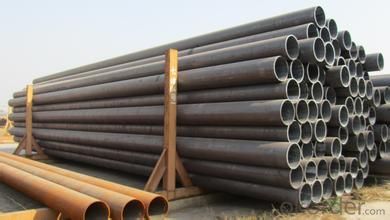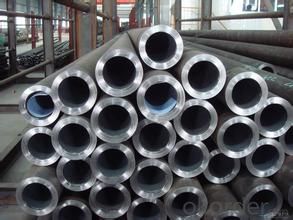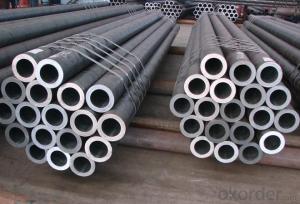Boiler Tubes Steel Pipe High Quality
- Loading Port:
- China Main Port
- Payment Terms:
- TT or LC
- Min Order Qty:
- 25 m.t.
- Supply Capability:
- 8000 m.t./month
OKorder Service Pledge
OKorder Financial Service
You Might Also Like
1、Structure of High Quality Boiler Tubes:
Boiler Tubes is used to produce boilers.
2、Main Features of the High Quality Boiler Tubes:
• High manufacturing accuracy
• High strength
• Small inertia resistance
• Strong heat dissipation ability
• Good visual effect
• Reasonable price
3、High Quality Boiler Tubes Specification:
Standard | GB, DIN, ASTM ASTM A106-2006, ASTM A53-2007 |
Grade | 10#-45#, 16Mn 10#, 20#, 45#, 16Mn |
Thickness | 8 - 33 mm |
Section Shape | Round |
Outer Diameter | 133 - 219 mm |
Place of Origin | Shandong, China (Mainland) |
Secondary Or Not | Non-secondary |
Application | Hydraulic Pipe |
Technique | Cold Drawn |
Certification | API |
Surface Treatment | factory state or painted black |
Special Pipe | API Pipe |
Alloy Or Not | Non-alloy |
Length | 5-12M |
Outer Diameter | 21.3-610mm |
Grade | 20#, 45#, Q345, API J55, API K55, API L80, API N80, API P110, A53B |
Standard | ASME, ASTM |
1) Material:20#(ASTM A 106/A53 GRB.API5LGRB,GB),45#,16Mn,10#.
2) Specification range:OD:21.3-610mm,WT:6-70mm,length:6-12m or according to the requirement of clients.
3) Excutive standards:GB,ASME API5L.ASTM A 106/A53,Despite of the above standards,we can also supply seamless steel pipe with standard of DIN,JIS,and so on,and also develop new products according to the requirements of our clients!
4) Surface:black lacquered,varnish coating or galvanized.
5) Ends:Beveled or square cut,plastic capped,painted.
6) Packing:bundles wrapped with strong steel strip,seaworthy packing.
4、Packaging & Delivery
Packaging Details: | seaworthy package,bundles wrapped with strong steel strip |
Delivery Detail: | 15-30days after received 30%TT |
5、FAQ of High Quality Boiler Tubes:
①How is the quality of your products?
Our products are manufactured strictly according to national and internaional standard, and we take a test
on every pipe before delivered out. If you want see our quality certifications and all kinds of testing report, please just ask us for it.
Guaranteed: If products’ quality don’t accord to discription as we give or the promise before you place order, we promise 100% refund.
②How about price?
Yes, we are factory and be able to give you lowest price below market one, and we have a policy that “ for saving time and absolutely honest business attitude, we quote as lowest as possible for any customer, and discount can be given according to quantity”,if you like bargain and factory price is not low enough as you think, just don’t waste your time.Please trust the quotation we would give you, it is professional one.
③Why should you chose us?
Chose happens because of quality, then price, We can give you both.Additionally, we can also offer professional products inquiry, products knowledge train(for agents), smooth goods delivery, exellent customer solution proposals.Our service formula: good quality+good price+good service=customer’s trust
SGS test is available, customer inspection before shipping is welcome, third party inspection is no problem.
6、High Quality Boiler Tubes Images:


- Q:What is the role of steel pipes in the construction of bridges and tunnels?
- The construction of bridges and tunnels heavily relies on steel pipes, which are widely used for various purposes due to their strength, durability, and versatility. When it comes to bridge construction, steel pipes are commonly utilized to fabricate the structural framework of the bridge. They act as the primary load-bearing members, providing support and stability to the entire structure. Steel pipes are particularly favored in bridge construction because of their high tensile strength, enabling them to withstand heavy loads, including the weight of vehicles and the dynamic forces generated by traffic. Steel pipes are also essential in the construction of bridge piers and abutments, which serve as the foundation and support for the bridge structure. To create sturdy foundations that can withstand the forces exerted by the bridge's weight and external factors such as wind, water currents, and seismic activity, steel pipes are often driven deep into the ground. Similarly, in tunnel construction, steel pipes play a critical role. They are extensively used for tunnel lining, which involves the installation of structural elements along the tunnel walls and roof to ensure stability and prevent soil or rock collapse. Steel pipes are commonly used as reinforcement elements, ensuring the structural integrity of the tunnel and protecting it from external pressures. Furthermore, steel pipes are utilized for underground utility systems in both bridges and tunnels. They act as conduits for various utilities, including water supply, electrical cables, gas pipelines, and communication lines. Steel pipes are ideal for these applications because of their corrosion resistance, ability to withstand high pressures, and long lifespan. In conclusion, steel pipes are crucial in the construction of bridges and tunnels as they provide strength, stability, and durability to these structures. They play a vital role in ensuring the safety and functionality of these critical infrastructure projects, allowing for efficient transportation and the seamless provision of utilities.
- Q:What are the different shapes available for steel pipes?
- There are several different shapes available for steel pipes, including round, square, rectangular, and oval.
- Q:How are steel pipes coated to prevent internal corrosion?
- Steel pipes are coated to prevent internal corrosion through a process called internal coating. This involves applying a layer of protective material, such as epoxy or polyethylene, to the inner surface of the pipe. The coating acts as a barrier, preventing the steel from coming into contact with corrosive substances in the fluid being transported, thus effectively reducing the risk of internal corrosion.
- Q:How are steel pipes used in building foundations?
- Steel pipes are commonly used in building foundations to provide structural support and stability. They are often driven into the ground to create deep foundation systems, such as pile foundations, which can bear heavy loads and transfer them to the underlying soil or rock. These pipes are also utilized in various types of foundation construction, such as caissons and drilled shafts, to ensure strength, durability, and resistance to ground movements.
- Q:How are steel pipes used in offshore wind farms?
- Steel pipes are used in offshore wind farms for various purposes such as the installation of wind turbine foundations, transmission of electricity, and protection of cables. These pipes provide a strong and durable structure to support the turbines and withstand harsh marine conditions, ensuring the efficient and reliable operation of the wind farm.
- Q:What is the difference between hot dip galvanized steel pipe and galvanized steel pipe?
- The difference between the process is that the hot dip galvanized pipe is dipped in the molten zinc bath and the galvanized pipe is plated with a metallic surface by means of unidirectional current in the plating bath. Hot plating process is fast, the coating is thick and consumes more zinc. Ordinary galvanized slow speed, thin coating.
- Q:Are steel pipes suitable for nuclear power plants?
- Steel pipes are an ideal choice for nuclear power plants. This is because steel is a commonly used material in the construction of these plants, thanks to its exceptional mechanical properties, high strength, and durability. Various applications in nuclear power plants rely on steel pipes, including the transportation of cooling water, hot gases, and steam. The steel used in nuclear power plants undergoes careful selection and testing to meet strict safety regulations and quality standards. This is crucial because these pipes must have outstanding resistance to corrosion and high-temperature environments. They are exposed to harsh conditions such as high pressure, high temperatures, and radioactive materials. Moreover, steel pipes have a long lifespan and require minimal maintenance. This makes them a cost-effective option for nuclear power plants. They can endure extreme conditions, ensuring the plant's safe and reliable operation. Additionally, steel pipes can be easily fabricated, installed, and repaired, which is vital for the efficient functioning of a nuclear power plant. In summary, steel pipes are highly suitable for nuclear power plants due to their strength, durability, resistance to corrosion, and ability to withstand extreme conditions.
- Q:Can steel pipes be used for flagpoles?
- Yes, steel pipes can be used for flagpoles. Steel pipes are often used for flagpoles due to their strength, durability, and ability to withstand harsh weather conditions. They can be easily fabricated to the desired height and thickness, making them suitable for flags of various sizes. Additionally, steel pipes can be painted or coated to prevent corrosion and enhance their aesthetic appeal.
- Q:What are the common welding techniques used for steel pipes?
- The common welding techniques used for steel pipes include Shielded Metal Arc Welding (SMAW or stick welding), Gas Metal Arc Welding (GMAW or MIG welding), Flux-Cored Arc Welding (FCAW), and Gas Tungsten Arc Welding (GTAW or TIG welding).
- Q:What are the common standards and specifications for steel pipes?
- The common standards and specifications for steel pipes include ASTM A53, ASTM A106, API 5L, and ISO 3183. These standards outline the requirements for the manufacturing, dimensions, and mechanical properties of steel pipes used in various industries such as oil and gas, construction, and transportation. Additionally, specific applications may have their own standards and specifications that need to be met for quality and safety purposes.
1. Manufacturer Overview |
|
|---|---|
| Location | |
| Year Established | |
| Annual Output Value | |
| Main Markets | |
| Company Certifications | |
2. Manufacturer Certificates |
|
|---|---|
| a) Certification Name | |
| Range | |
| Reference | |
| Validity Period | |
3. Manufacturer Capability |
|
|---|---|
| a)Trade Capacity | |
| Nearest Port | |
| Export Percentage | |
| No.of Employees in Trade Department | |
| Language Spoken: | |
| b)Factory Information | |
| Factory Size: | |
| No. of Production Lines | |
| Contract Manufacturing | |
| Product Price Range | |
Send your message to us
Boiler Tubes Steel Pipe High Quality
- Loading Port:
- China Main Port
- Payment Terms:
- TT or LC
- Min Order Qty:
- 25 m.t.
- Supply Capability:
- 8000 m.t./month
OKorder Service Pledge
OKorder Financial Service
Similar products
New products
Hot products
Related keywords





























